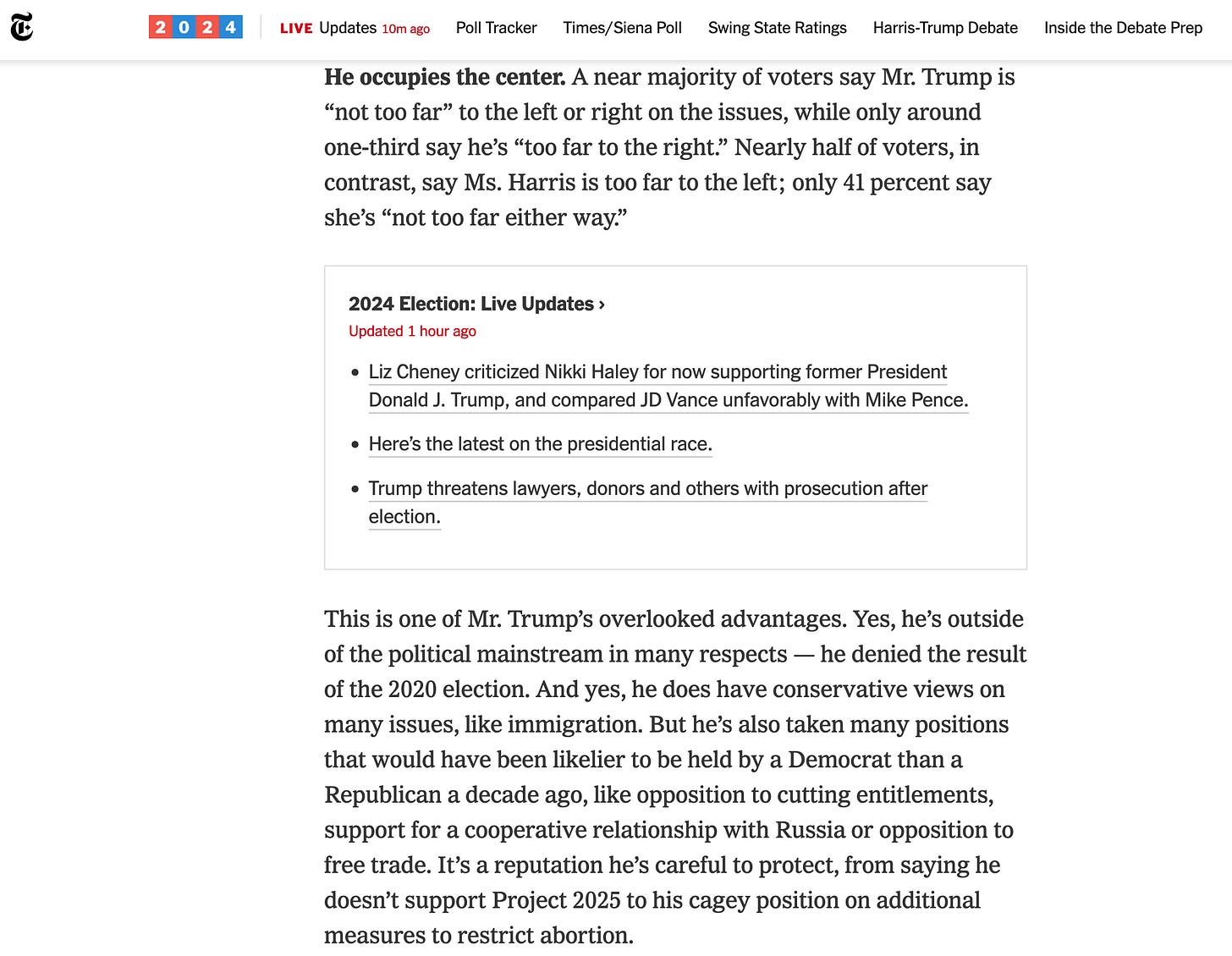MAGAReport for 9/8/2024 - NYT says Trump is a Centrist
If anyone thinks Trump is a centrist, all of us on the extremist beat are failing
On Sunday, I was reading the New York Times’ analysis of their new poll, and I have had difficulty focusing today because of how astonished I am by one part of it. I am putting it here as a screenshot because the context itself is so important.
They are talking about Trump’s polling strengths and this section says that he “occupies the center”:
I want to start by noting that in the middle of this section is a box, and the third bullet links to one of the NYT’s own stories about Trump threatening to prosecute his political enemies after the election. How can there be a paragraph about Trump being the centrist in the race that sandwiches a story about his blatant, authoritarian tactics?
The first paragraph here summarizes the poll results on this point (and I’ve got a lot of issue with characterizing the “near majority” who think Trump is in the middle as substantially different from the 41% who say Harris is in that same space, but that’s a different rant…).
The second paragraph hand waves away Trump’s attempt to overthrow the election, and then goes on to points that make my head spin. Casting Trump’s feelings toward Putin as wanting a Democrat-like “cooperative relationship with Russia”? Describing his position as “cagey” on abortion? Giving credence to his statements about protecting entitlements that he has threatened repeatedly? I feel like I have entered an alternate dimension with all of this.
I have a lot of feelings about how the NYT treats Trump, but media criticism is not my beat here. Let’s go back to that first paragraph where half the people polled seem to believe that Trump is some kind of centrist. If that is true, then all of us reporting on extremism have profoundly failed to explain what Trump stands for and the threat that comes with it.
This has made me reflect on my own project today, and I realize that in studying the psychology of the MAGA movement, I am actually studying the psychology of what draws people to fascist politics. Indeed for Trump, his fascism is his main appeal. All the psychology I’m looking at applies specifically people with those traits are susceptible to fascist tactics.
And what do we mean by fascism? There are many good characterizations, and I am partial to Jason Stanley’s as laid out in his fantastic book, “How Fascism Works: The Politics of Us and Them”. If you have spoken to me in person this summer, I have recommended this book to you; it pulled together my own understanding of fascism in a really clean way. Stanley specifically speaks about fascist politics, which can exist even without a fascist regime. This is his list of the tactics of fascist politics (summary courtesy of Wikipedia):
The mythical past—used to invoke a nostalgia for a fictional time when the nation was great as it was not yet sullied by the “Other.”
Propaganda—to attack enemies, to justify violence, to justify laws against “Them” and to support the authoritarian leader.
Anti-intellectualism—to attack the media, universities, and scientists when they contradict the strong man’s authority.
Unreality—supporting conspiracy theories that tarnish the “Other” along with an outright denial of facts when convenient.
Hierarchy—espousing a “natural order” where the “Us” are hardworking, moral, law-abiding and productive members of society, while the “Other” is not.
Victimhood—casting “Us” as victims of “Them”, who are taking resources from “Us” and demanding special rights.
Law and order—using laws to justify violence, oppression, and expulsion of the “Other”.
Sexual anxiety—as the “Other” embraces non-traditional approaches to sexuality,
Appeals to the heartland—as rural communities are often more homogeneous and conservative (more “Us”) while urban cities are often more diverse, cosmopolitan (more “Them”).
Dismantling of public welfare and unity—by casting aside safety net programs as unfair giveaways to “Them”, who are not working, as opposed to “Us”, who are.
As someone who has listened to dozens of Trump speeches this summer alone, I see at least one of these tactics in nearly every sentence he utters. When I get a free day, I may annotate a rally speech (skipping the stories about sharks and batteries, perhaps), to highlight just how deeply these fascist tactics are infused into it.
But for everything going forward, I feel like it’s important to call out these fascist connections so no one can be left thinking Trump occupies any political space close to the center.



I had had enough of the NYT's characterization of this man and the far right extremism as legitimate and worthy of serious consideration that I regretfully canceled my full subscription. I'm truly dismayed by the direction they have taken. This is yet one more proof of my point. Jen, once again, thank you for your research and report out for those of us who do not agree to future fascism in our country.